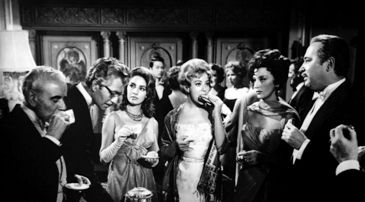The guests at a wealthy dinner party find themselves unable to leave the premises, in Luis Buñuel’s satiric fable. 
Spanish director Luis Buñuel went into exile from his native land after Franco’s military coup in 1936. He went to Hollywood and managed to scrape by translating and supervising the dubbing of Latin American films there. Eventually he found a more congenial environment in Mexico, where he made 21 films from the late 1940s through the early ‘60s. After he was allowed to return to Spain and make the film Viridiana in 1961, it shared the top award at Cannes, after which (and this is amusingly consistent with Buñuel’s work in general) it was banned in Spain for being too leftist, and condemned by the Vatican for blasphemy. Back he went to Mexico and made another film there, not of outrageous defiance this time, but from an allusive, symbolic point of view. It was his 20th Mexican film, and it marked the beginning of Buñuel’s final creative period, during which he returned to Europe and to the surrealism he had begun with as a young man. From 1962, the film is called The Exterminating Angel.
In an unnamed city, a very wealthy couple gives a large dinner party in their mansion, with about twenty aristocratic guests. After the meal, they go to the drawing room, continuing to relax and talk, while the servants all go home. It gets late, and one would think the guests should start leaving, but instead they just lie down on couches and on the floor and go to sleep. Well, the next morning it gradually dawns on them that they are, in fact, unable to leave the house. Some strange unseen power makes them afraid of opening a door and walking out. And it soon becomes evident that no one outside the house can get in either.
Days go by, and they’re running out of food and water. Everyone is grimy—they start to stink. Meanwhile we, the viewers, get to know these people in an uncomfortably intimate way. There are several different plot strands in which our highly civilized characters display their baser impulses, and suffer from a collapse of social conventions and niceties that can no longer sustain them. There is a satiric savagery in this tale, which maps out the ways that an upper class is trapped in a bubble of its own privilege. There are also thematic links to be made with the decrepitude and isolation of fascist Spain at the time.
And yet, Buñuel refused to do satire the way people expected. The Exterminating Angel doesn’t attempt to be stylish or exuberant or even comic. This humor is very dry, and the method is plain almost to the point of banality. Nor does he show contempt for his characters. They may have shallow hearts, they may be largely un-self-aware, but they’re still human beings who were children once. The misfortunes that befall the people in this movie are aimed at ourselves, the audience, as well. Nobody in the film can perceive the true situation, only their own confining points of view. The deliberate matter-of-fact quality is the way Buñuel expresses his love of cinema as the people’s art form. His style attempts to shake us awake from the fictional dream, and that can be disconcerting.
So what does the title mean, The Exterminating Angel? Buñuel got it from a poem written by a friend. The angel might be that invisible force keeping everyone from leaving the house. But what is the angel exterminating? Perhaps everything that ties us to material things, perhaps our most stubborn illusions.

Guillermo del Toro adds his own Gothic sensibility to this thrilling new version of an old film noir. After winning the Best Picture Oscar...

A gang of women steal oil from Brazilian pipelines, refining it into gas to be sold on the black market. On a firelit night...

The yearning and frustrations of two teenage girls in 1950s New Zealand leads to tragedy, in this wildly expressive film based on an actual...